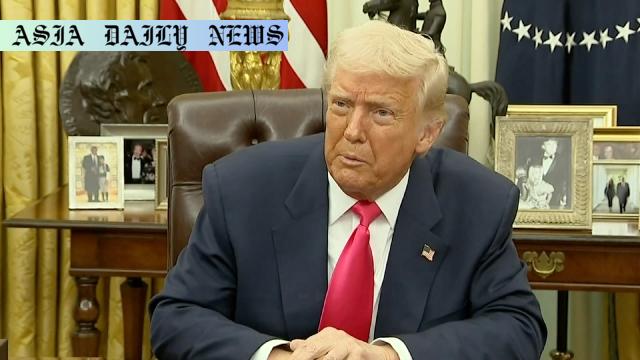Japan-US Security Treaty highlights ‘imbalance’ in mutual defense responsibilities, as Trump calls the agreement ‘unfair.’
Trump criticizes the Japan-US Security Treaty for being unfair.
He highlights the lack of reciprocity in protection responsibilities.
Trump questioned the origins of the agreement and previous negotiations.

Introduction to the Japan-US Security Treaty
The Japan-US Security Treaty, established in 1951 and revised in 1960, is a foundational agreement defining the defense relationship between these two major allies. While the United States is committed to defending Japan in the case of an armed attack, Japan does not have an equivalent obligation to protect the US. This asymmetry has often been a topic of discussion, particularly in the context of defense spending and strategic partnerships. US President Donald Trump’s recent comments have reignited debates surrounding this agreement and its fairness, presenting an opportunity to reexamine the treaty’s implications and historical context.
Trump’s Criticism: An Asymmetrical Burden
In his remarks, President Trump characterized the Japan-US Security Treaty as imbalanced and unfair. He highlighted that the United States is obligated to protect Japan under almost any circumstances, yet Japan bears no such direct responsibility to defend the US. Trump suggested that this unreciprocated obligation allows Japan to reap economic and strategic benefits without sharing equal military burdens. His comments reflect long-standing concerns about alliance cost-sharing among American policymakers, particularly regarding military alliances such as NATO and bilateral partnerships like the one with Japan.
Japan’s Economic Gains and Implications for the US
Trump asserted that the treaty has allowed Japan to build its economic power while relying on the US military for security. He referred to Japan’s economic success as a “fortune” facilitated, in part, by its relationship with Washington. This perspective resonates with broader critiques Trump has made regarding America’s role in global defense commitments. However, this viewpoint does not fully account for Japan’s contributions to shared security interests, such as hosting US military bases, funding base operations, and cooperating on regional security issues like North Korean nuclear threats.
Historical Context and Ongoing Debates
The original Japan-US Security Treaty was signed in the aftermath of World War II, during Japan’s period of postwar reconstruction. It symbolized Japan’s renunciation of aggressive militarism and reliance on the US for protection. Over the decades, the treaty has also served as a cornerstone of regional stability in East Asia. However, Trump’s questioning of the treaty’s structure has raised concerns about its future viability. His calls for renegotiation echo similar demands he made to NATO allies to increase defense spending, emphasizing a transactional approach to international relationships.
Conclusion: Challenges for Strategic Alliances
Trump’s comments highlight the challenges of maintaining strategic alliances in a changing geopolitical landscape. As global power balances shift, longstanding agreements such as the Japan-US Security Treaty may face renewed scrutiny. While the treaty has undoubtedly contributed to Japan’s security and prosperity, it has also provided the US with significant benefits, including a strategic foothold in East Asia. The future of this partnership may depend on the ability of both nations to address concerns about fairness and mutual contributions, ensuring that the alliance remains robust and adaptable in the decades to come.
Commentary
The Complexity of Fairness in Alliances
The Japan-US Security Treaty represents a fascinating intersection of diplomacy, history, and strategic necessity. On the surface, Trump’s critiques of the agreement may seem to address a critical imbalance. After all, fairness and reciprocity are core tenets of any partnership. However, the strength of alliances often lies in their nuanced asymmetries, where each party contributes what it can to their unique circumstances. The US benefits from a powerful and loyal ally in Japan, gaining access to crucial military bases and strategic points in East Asia, while Japan avoids the militarization pitfalls of the past. These contributions, though distinct, form a partnership that transcends mere transactional agreements.
Economic and Strategic Argument
Trump’s claim that Japan has built a “fortune” under the protective umbrella of the US military may oversimplify the dynamics of the alliance. Japan’s economic growth is the result of decades of policy planning, innovation, and investment. While having American military support undoubtedly provided a sense of security, attributing its economic prosperity solely to this support diminishes Japan’s agency in its progress. Additionally, Japan’s financial contributions to hosting US forces and its cooperation on regional security issues illustrate its commitment to the alliance, albeit in ways that differ from direct military obligations.
Future Dialogue on Defense Treaties
Trump’s critique invites a necessary dialogue about the future of international defense agreements. As geopolitical challenges evolve, alliances established in the mid-20th century must adapt to new realities. Yet, this adaptation requires thoughtful negotiation rather than one-sided demands for change. The Japan-US Security Treaty has been a stabilizing force in East Asia, and its value cannot be underestimated. Moving forward, both nations must focus on reaffirming their mutual trust, refining contributions to shared goals, and ensuring that the treaty remains a cornerstone of regional and global stability. Such reflections will be crucial in maintaining the effectiveness and fairness of this vital partnership.


